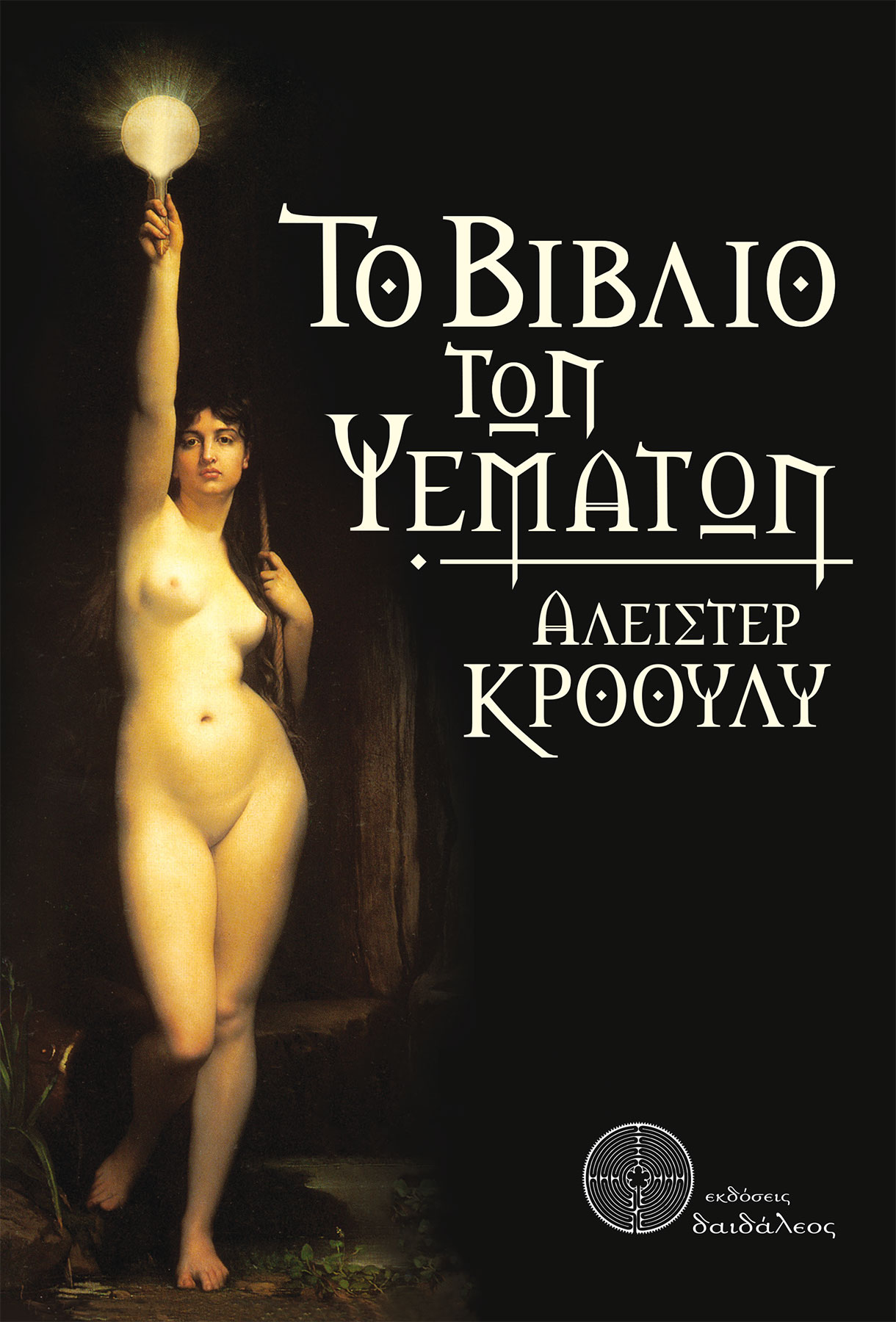ΓΡΑΦΕΙ Ο FRATER ΤΕΛΕΣΦΟΡΟΣ
ΔΙΑΔΑΣΚΑΛΟΣ ΤΗΣ ΟΑΣΕΩΣ ΑΣΤΡΑΙΑ ΤΟΥ Ο.Τ.Ο. ΕΛΛΑΔΟΣ
Ο Άγγλος ποιητής, μυστικιστής, ζωγράφος και συγγραφέας Άλειστερ Κρόουλυ (1875-1947) είναι μία από τις πλέον καθοριστικές μορφές του σύγχρονου Δυτικού Εσωτερισμού. Παρόλο που μεγάλωσε σε μια οικογένεια που ανήκε στο φονταμενταλιστικό προτεσταντικό κίνημα των Αδελφών του Πλύμουθ, στη νεότητά του απέρριψε τη θρησκοληψία τους και αναζήτησε έναν νέο πνευματικό δρόμο. Η αναζήτησή του τον έφερε στον Ερμητικό Τάγμα της Χρυσής Αυγής όπου μυήθηκε και έλαβε εκεί την αποκρυφιστική του εκπαίδευση. Ωστόσο οι έριδες που διέλυσαν το Τάγμα, τον έκαναν να απομακρυνθεί από αυτό και ήταν τότε που ταξίδεψε σε διάφορα μέρη της υφηλίου, μεταξύ των οποίων η Ινδία, η Βιρμανία και η Σρι Λάνκα, όπου μελέτησε τον Ινδουισμό και τον Βουδισμό και ασκήθηκε στην πρακτική της Γιόγκα.
Το κομβικό σημείο στη ζωή του ήταν κατά τον μήνα του μέλιτος στο Κάιρο της Αιγύπτου όπου έλαβε και κατέγραψε Το Βιβλίο του Νόμου (Liber AL vel Legis) καθ’ υπαγόρευση μιας υπερφυσικής οντότητας με το όνομα Άιβας (Aiwass). Το σύντομο αυτό κείμενο ανακήρυσσε τη γέννηση μιας νέας κοσμικής εποχής για την ανθρωπότητα, ενός «Νέου Αιώνα» πνευματικής αφύπνισης και ηθικής απελευθέρωσης. Παράλληλα παρουσίαζε τον Νόμο του Θελήματος στον κόσμο, ο οποίος συνοψίζεται στις δύο φράσεις: «Πράττε αυτό που θέλεις θα είναι όλος ο Νόμος» και «Αγάπη είναι ο νόμος, αγάπη υπό το θέλημα». Το Βιβλίο του Νόμου αποτέλεσε για τον Κρόουλυ τη βάση πάνω στην οποία θεμελίωσε το εσωτερικό κίνημα του Θελήματος (Thelema), τόσο φιλοσοφικά όσο και σαν μυητικό δρόμο, ένα κίνημα που συνεχίζει να αναπτύσσεται μέχρι τις μέρες μας, τόσο μέσα από τα Τάγματα των οποίων ο ίδιος ηγήθηκε -του Ordo Templi Orientis και του A∴A∴- όσο και στην ευρύτερη εσωτερική σκηνή.
Ο Κρόουλυ είναι περισσότερο γνωστός σαν συγγραφέας αποκρυφιστικών έργων που άσκησαν μεγάλη επιρροή στον σύγχρονο Δυτικό Εσωτερισμό. Η καινοτομία του ήταν ο συνδυασμός της επιστημονικής μεθοδολογίας με την πρακτική του ανατολικού και δυτικού εσωτερισμού· Ονόμασε αυτήν τη προσέγγιση, που συνδυάζει τον στόχο της θρησκείας με τη μέθοδο της επιστήμης, Επιστημονικό Διαφωτισμό (Scientific Illuminism). Σύμφωνα με αυτήν ο ασκούμενος αντιμετωπίζει τις πρακτικές του σαν επιστημονικά πειράματα, καταγράφοντας και αξιολογώντας τα ώστε να αποκτήσει μια πιο καθαρή εικόνα του πως λειτουργούν αυτές αλλά και πως επιδρούν στον ίδιο. Τα εσωτερικά του έργα καταπιάνονται με την τελετουργική μαγεία, τη γιόγκα, τον διαλογισμό, την Καμπαλά, την εσωτερική φιλοσοφία, την οντολογία, την ηθική πάντα με φόντο το μυητικό σύστημα του Θελήματος.
Έζησε μια ταραχώδη ζωή που συχνά προκαλούσε τη σεμνοτυφία της εποχής του με αποτέλεσμα ο κίτρινος τύπος να τον στιγματίσει με μια μαύρη φημολογία που συνοδεύει το πρόσωπό του μέχρι σήμερα, αν και πιο περιορισμένα καθώς πλέον υπάρχουν αρκετές βιογραφίες που ξεκαθαρίζουν τις φήμες από την αλήθεια. Πράγματι, αν κανείς διαβάσει ειλικρινά και χωρίς προκατάληψη τα έργα του ανακαλύπτει όχι μια προτροπή σε ηδονισμό και ασυδοσία αλλά ένα μήνυμα προσωπικής ευθύνης για την αυτοπραγμάτωση που αγκαλιάζει κάθε πλευρά του ανθρώπου, τα ύψη του αλλά και τα βάθη του. Βέβαια από τον χαρακτήρα του δεν απουσιάζουν τα προβληματικά στοιχεία αλλά είναι ακριβώς αυτά που τον κάνουν να ξεχωρίζει από άλλους πνευματικούς δασκάλους που απεικονίζονται συνήθως σαν φιγούρες αγνού φωτός και ηθικής τελειότητας. Τα μειονεκτήματα του Άλειστερ Κρόουλυ τον κάνουν ανθρώπινο και βοηθούν τον μελετητή του έργου του να εστιάσει στο μήνυμα και όχι στον αγγελιοφόρο, προτάσσοντας έτσι όχι την εξιδανίκευση αλλά τη σφαιρική ολοκλήρωση του ανθρώπου. Έτσι το ερώτημα για καθέναν και καθεμία που προσεγγίζει το έργο του εν τέλει δεν είναι τι είπε ή τι έκανε κάποτε ο Άλειστερ Κρόουλυ αλλά τι δύναται να πραγματώσει στο εδώ και στο τώρα ο ίδιος.
Οι ιδέες του και ο διονυσιασμός του ενέπνευσαν το λεγόμενο counterculture των 60s και 70s. Ο εναγκαλισμός του της τέχνης, της ποίησης και του θεάτρου στην πρακτική της μαγείας αποτέλεσε έμπνευση για πολλούς καλλιτέχνες και βλέπουμε την επιρροή του διακριτικά παρούσα σε διάφορες εκφάνσεις της pop κουλτούρας σήμερα. Τα πεδία που ο ίδιος εξερεύνησε σε πιο εχθρικές εποχές πλέον μπορούν σήμερα να μελετηθούν σε ένα πιο φιλικό και γόνιμο έδαφος ενώ το μήνυμά του περί κοινωνικής και πνευματικής απελευθέρωσης παραμένουν πιο επίκαιρα από ποτέ.
ΔΕΙΤΕ ΤΟ ΒΙΒΛΙΟ ΤΩΝ ΨΕΜΑΤΩΝ

